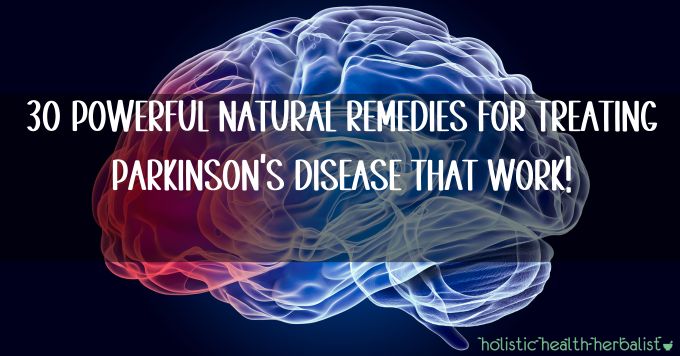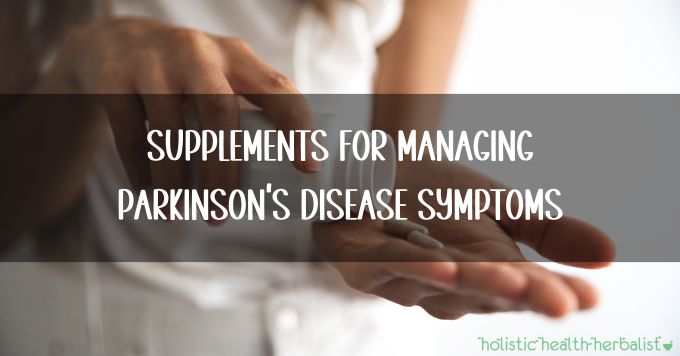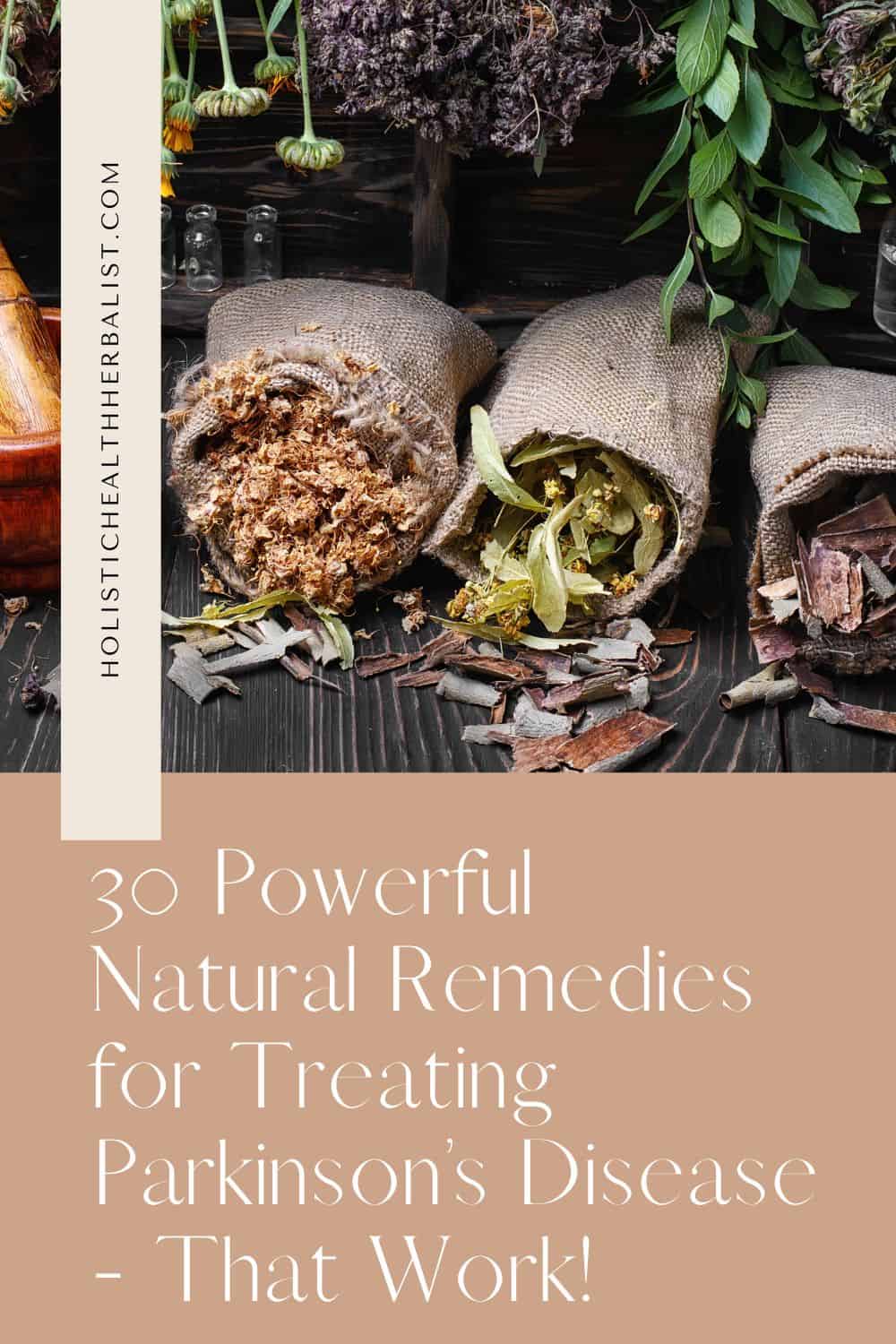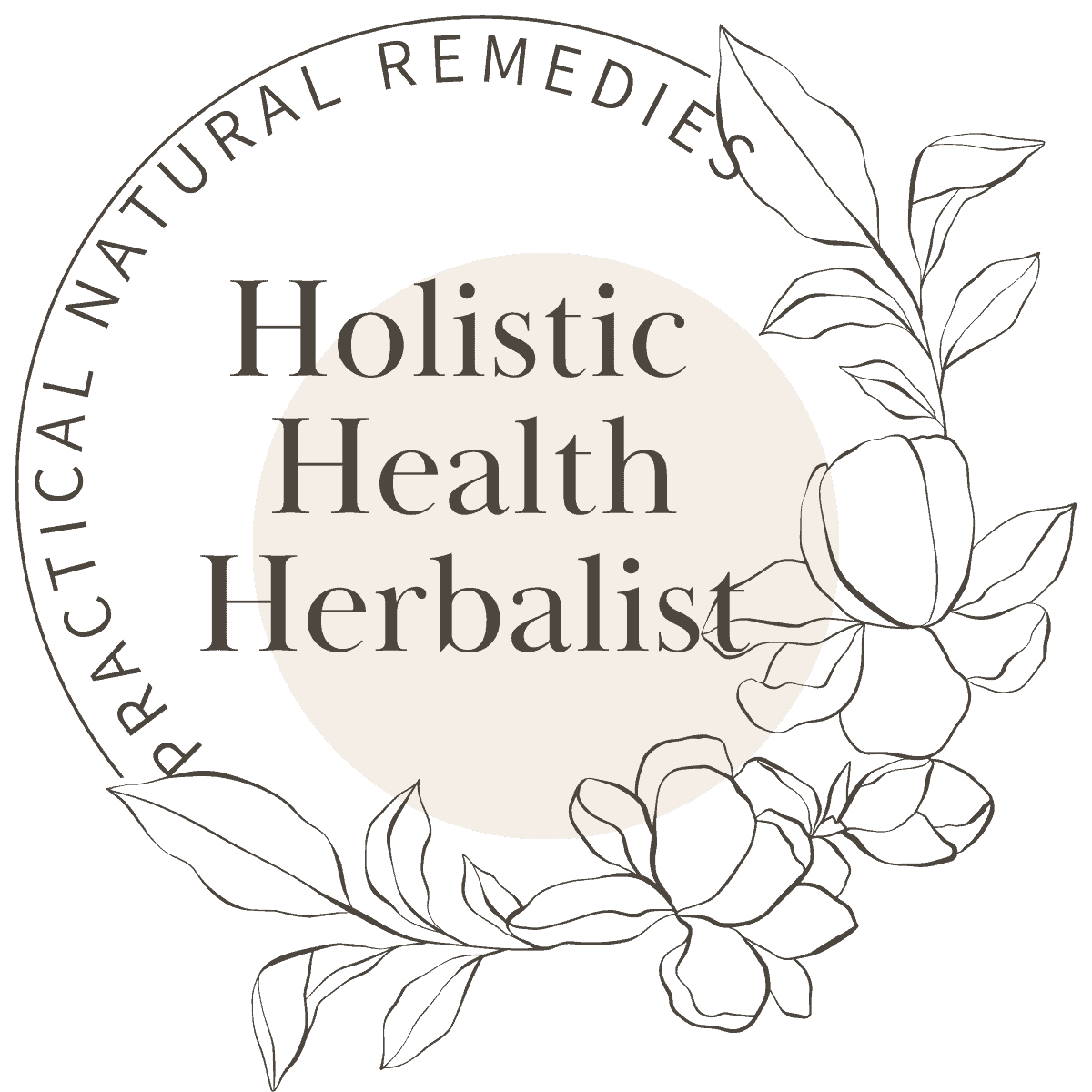
Natural remedies for Parkinson's disease can offer a ray of hope in the daunting journey against this neurodegenerative disorder.
For many, the path is often challenging and filled with uncertainty and fear.
Imagine being diagnosed with Parkinson’s. You're unexpectedly confronted with a condition that has the potential to modify your physical abilities, stability, and even verbal communication.
No doubt it's terrifying! But here's the truth...
You are not the only one to confront this challenge.
With advancements in medicine combined with natural remedies for Parkinson's disease, managing symptoms has become more achievable than ever before.
Understanding Parkinson's Disease and Its Impact
Parkinson's disease is a progressive nervous system disorder where voluntary movement is impaired or lost.
Although PD can eventually affect the entire body, it most notably impairs semivoluntary motions like swinging your arms while walking, keeping your jaw in place so that the mouth stays closed, and moving your tongue so that your speech is clear and precise.
Parkinson's disease rarely affects those under 60 and men are 30% more likely to develop it than women.
This disease pinpoints very specific sections of the brain called the basal cell ganglia. When the nerves begin to deteriorate, it causes a chemical imbalance that can disable the entire body.
PD is caused by the degeneration of neurons in an area of the brain known as substantia nigra.
In a healthy brain, two neurotransmitters called acetylcholine and dopamine work together to regulate muscle action.
Acetylcholine helps muscles contract (without it, we would become limp), while dopamine tempers acetylcholine's effect by transmitting signals within the brain to coordinate movement.
Parkinson's disease throws this chemical duo off balance, reducing dopamine levels and causing the muscles to become tightly contracted.
The Parkinson's Foundation estimates that about one million people will be living with PD in the U.S by 2023.
The Symptoms of Parkinson's Disease
The symptoms of Parkinson's disease develop very gradually over a 10-15 year period. The first sign is usually a tremor in one hand, which disappears when you move the hand or go to sleep.
As the disease progresses, the trembling becomes more pronounced and spreads to other areas of the body, usually the arms, legs, and head.
The arms and legs will feel shaky, heavy, and rigid, and the face will become masklike. Those with advanced PD will gradually begin to lose the ability to write smoothly and speak clearly.
Other symptoms of Parkinson's disease Include:
- A "pill-rolling" motion of the hand and thumb
- A heavy feeling in the arms and legs
- A mask-like facial expression
- A shuffling gait, with arms close to the body
- A stooped posture
- Bradykinesia (slowness of movement)
- Depression and fatigue
- Difficulty speaking
- Digestive issues, including constipation
- Drooling
- Eventual inability to perform most voluntary and semivoluntary movements
- Postural instability (balance problems)
- Rigidity (stiff muscles)
- Sexual dysfunction
- Skin problems
- Tremors (shaking)
- Trouble sleeping
- Trouble speaking or eating normally
- Urinary problems
- Voice changes
As the condition advances, it can have a major effect on everyday undertakings like walking, talking, emptying the bowel, and even eating.
Testing Techniques for Parkinson's Disease
There are various methods used to test for Parkinson's disease.
These tests include:
- Hormone testing- thyroid, DHEA, cortisol, testosterone, IGF-1, estrogen, and progesterone through saliva, blood, or urine collection.
- Intestinal permeability - urine
- Detoxification profile - urine
- Vitamin and mineral deficiencies (especially CoQ10) - blood
- Digestive function and microbe/parasite/candida testing - stool analysis
- Food and environmental allergies and sensitivities - blood
- Toxic/heavy metals - hair and urine
- Pesticides and other environmental toxins - urine and blood
The Root Causes of Parkinson's Disease
There are no definitive causes known for Parkinson's disease, but there are some suspect causes and aggravating factors.
Suspected root causes include:
- Carbon-monoxide poisoning
- Food allergies
- Free radicals
- Heavy metals
- Inflammatory brain disorder
- Insecticides, pesticides, and herbicides
- Poor nutrition
A Global Concern: The Prevalence Of Parkinson's Disease
According to recent statistics from various global health organizations, an estimated seven to ten million individuals worldwide live with this neurodegenerative condition. In fact, the occurrence of PD has increased tenfold since the 1970s.
This seems to correlate with increased environmental toxins and the Standard American Diet, which lacks whole-food nutrition.
Men seem to have higher incidence rates than women, suggesting possible gender-based biological factors influencing its occurrence.
The Role Of Age In Onset And Progression
Late onset PD patients who start showing signs around their sixties or seventies make up the majority of those diagnosed, whereas younger populations do experience what is referred to as the 'early form,' but far less frequently compared to their elderly counterparts.
The overall increase is observed significantly among those above 60 years old, hinting towards a potential role of the aging process in the development and progression of the disease due to the nature in which the cellular damage accumulates, eventually leading to symptoms later in life.
Conventional Treatments for Parkinson's Disease
In the realm of medical treatments, conventional methods often take center stage when it comes to managing diseases like Parkinson's.
These approaches aim to control symptoms and enhance patients' quality of life.
The cornerstone treatment strategy in PD management involves pharmacotherapy or medication therapy with drugs specifically designed for this condition, such as Levodopa, dopamine agonists, and MAO-B inhibitors.
Levodopa, typically combined with Carbidopa (Sinemet), stands out as a potent drug choice due to its effectiveness in controlling motor symptoms related to PD by increasing brain levels of dopamine, which improves nerve conduction.
Dopamine Agonists: Mimicking Dopamine Action
Apart from levodopa, there are other medications known as dopamine agonists that mimic the action of dopamine on your neurons, thus relieving Parkinsonian tremors and stiffness, among other symptoms.
Pramipexole (Mirapex) and Ropinirole (Requip) fall under this category and can be used alone during the early stages of the disease and together in later stages when the effect starts to wane off.
This broad spectrum approach towards symptom control allows physicians to tailor the most suitable treatment plan based on individual patient needs, severity, and progression course of the disease.
However, one must always be aware of possible adverse reactions and side effects associated with each of these therapeutic options.
Potential Side Effects Of Conventional Medications For PD
It's important to note that while anti-Parkinson drugs provide significant symptomatic relief, they're not without drawbacks.
Prolonged use, particularly at large doses, may cause issues such as dyskinesia (uncontrolled jerky motions).
These medications also carry the risk of causing hallucinations with excessive usage.
Selegiline (Eldepryl), a type of MAO-B inhibitor, has been reported to cause nausea, insomnia, among other side effects. Hence, any new regimen should be thoroughly discussed between the physician and patient to ensure that the benefits outweigh the risks involved in taking them regularly.
The Role of Dopamine in Parkinson's Disease
Dopamine, a critical neurotransmitter, is central to maintaining healthy brain function. It plays a crucial role in mood and emotional regulation, motor control, and other vital functions linked with brain health.
Dopaminergic neurons in the substantia nigra area of the brain are impaired or destroyed in PD, leading to decreased dopamine levels.
When these cells degenerate, they cease the production of dopamine, leading to decreased communication between nerve cells that coordinate movement - resulting in PD symptoms like tremors and balance issues.
Boosting Dopamine Levels Naturally
Understanding dopamine's crucial role in PD progression makes it clear why strategies aimed at boosting its levels could potentially help manage some symptoms associated with this disorder.
One such natural approach involves dietary changes, including consuming foods rich in tyrosine - an amino acid precursor necessary for synthesizing dopamine.
- Foods Rich In Tyrosine like avocados, bananas, chicken breast, and almonds, aid our bodies' own production process when consumed regularly. Following diets enriched with these types of food items may contribute positively towards maintaining optimum neural functioning by supporting higher endogenous generation rates for important neurotransmitters like dopamine.
- Mucuna Pruriens Supplementation:
Beyond diet modifications alone, though, lies another promising avenue: supplementation using certain herbs known traditionally for their neuroprotective properties - one such example being Mucuna pruriens. Studies have shown. Seeds from this plant contain naturally occurring L-Dopa (Levodopa) - a direct precursor molecule used directly by our body during biosynthesis processes aiming to increase internal concentration levels against deficits caused by conditions such as Parkinson's.
Key Takeaway:
Parkinson's disease depletes dopamine, causing symptoms like tremors. Boosting dopamine naturally may help manage these issues. Consuming tyrosine-rich foods like avocados and chicken aids our bodies' production process. Additionally, supplements such as Mucuna pruriens can provide neuroprotective benefits due to its L-Dopa content.
Exploring the Potential of Alternative Therapies for Parkinson's Disease
Parkinson's disease presents a complex health challenge, but alternative therapies, herbal medicine, and certain lifestyle changes are showing promise in managing its symptoms.
These complementary approaches to traditional medicine offer patients an avenue towards holistic well-being.
Recommended Diet for Parkinson's Disease
Getting proper nutrition is key to supporting one's health while managing Parkinson's disease.
Studies have found that keeping your protein intake lower during the day while eating most of your daily protein needs at dinner is helpful.
High-protein foods to focus on include:
- Beans (Fava beans are especially helpful for preventing Parkinson's disease since they contain natural levodopa)
- Legumes
- Soy products like tofu
- Fish
Consuming raw fruits and vegetables, nuts, and seeds for 50-75% of your daily diet will also help the body fight free radical damage - a key tactic for protecting neurological health.
Cold-pressed oils like olive oil and avocado oil on your salads will provide a rich source of vitamin E - a powerful antioxidant important in treating and preventing Parkinson's disease. Make sure they are fresh and pure.
Rancid oils or oils cut with cheap vegetable oils like canola oil will raise free radical damage and are best avoided.
Fresh vegetable juices are excellent for providing vital minerals to the body.
Consider adding live cultured yogurt to your daily meals to enhance and support healthy digestion.
Staying hydrated will help the body flush toxins and is an important step that should not be forgotten!
Foods to Avoid
- An overabundance of protein in the diet (many with Parkinson's who decreased animal protein consumption have seen an improvement in tremors, muscle control, and coordination)
- Processed foods and junk food
- Artificial sweeteners
- MSG
- Caffeine
- Sugar
- Alcohol
- Food allergy triggers
- General overeating (this increases free radicals in the body)
Acupuncture as an Alternative Therapy
Traditional medicine has long recognized acupuncture as a beneficial treatment for various ailments. Recent studies suggest that this needle-based Chinese therapy may help improve motor symptoms in patients with Parkinson's disease.
Massage
Studies have shown that mobility increased and muscle rigidity and resting tremors were reduced after a 60-minute massage.
This suggests that movement therapies like the Alexander Technique (a discipline that emphasizes posture and balance) and the Feldenkrais Method (which retrains the body to do complex movements) may help patients with Parkinson's disease retain mobility.
Tai Chi: Enhancing Balance and Mobility through Movement Therapy
A prime example of movement therapy is Tai Chi, also known as "meditation in motion." This Chinese martial art combines deep breathing with slow movements, promoting physical balance while reducing stress levels.
In fact, research published by the New England Journal of Medicine revealed that individuals diagnosed with mild-to-moderate Parkinson's who regularly practiced Tai Chi demonstrated improved balance control compared to those participating in resistance training or stretching exercises.
The improvement was attributed not only to increased muscle strength but also enhanced mind-body awareness fostered by practicing Tai Chi.
The benefits extend beyond just improving physical balance; it has been observed that this gentle, rhythmic exercise helps reduce tremors - one of the most common symptoms experienced by people living with Parkinson's - thus enhancing motor control abilities significantly.
Occupational Therapy: Simplifying Everyday Tasks
Moving past movement-based practices like Tai Chi, we find occupational therapy playing a pivotal role within the realm of alternative therapies available for PD patients.
Occupational therapists work closely alongside their clients and families, providing strategies tailored specifically around individual needs, making everyday tasks easier despite challenges posed due to impaired motor functions caused by PD.
The American Occupational Therapy Association offers resources detailing how these professionals can support individuals dealing with neurological conditions, including PD.
As our exploration into natural remedies continues, let us examine herbal treatments that have shown great potential in protecting brain cells, thereby boosting cognitive functions.
Key Takeaway:
Alternative therapies like Tai Chi and occupational therapy are offering Parkinson's patients new hope. With their focus on holistic well-being, these practices not only improve physical symptoms but also enhance mental wellness, simplifying everyday tasks for those living with the disease.
Natural Remedies for Parkinson's Disease: 14 Herbs for Managing Symptoms

The world of herbal remedies offers a variety of options to help manage the symptoms associated with Parkinson's disease.
These natural alternatives aim to protect brain cells, enhance cognitive function, and alleviate other physical manifestations.
I have listed the best herbs for Parkinson's disease below.
1. American Skullcap (Scutellaria lateriflora)
American skullcap, aka Western Skullcap, is traditionally used for:
- Depression (source)
- Restlessness
- Nervous excitability
- Insomnia accompanied by irritability
- The inability to sleep without pain or discomfort
- Irregular muscle action like tremors, twitching, and restlessness
American Skullcap is a soothing nervine, which means it acts on the nervous system and helps relax both the mind and body. It is especially helpful for treating tremors and twitching when combined with milky oats (Avena sativa).
American Skullcap is not sedating and will not reduce energy or cognition, making it a perfect herb to use during the day.
You can get American Skullcap HERE.
2. Ashwagandha (Withania somnifera)
This is one of my favorite adaptogenic herbs since it's good for so many things, including supporting our mental, emotional, and physical health!
Ashwagandha is known for its ability to help the body react to stress in the best way possible, as well as increase our resistance to disease. It also revitalizes the body during times of physical and mental deficiency.
For Parkinson's disease, Ashwagandha has proven to be an effective memory enhancer due to its GABA-like effect on the brain, as well as its ability to reduce age-related neurological diseases (Source).
It also stimulates the acetylcholine receptors and helps inhibit neurotoxicity caused by heavy metals in the body (Source).
You can get Ashwagandha HERE.
3. Bacopa monneri
Also known as Brahmi, this Ayurvedic herb has been used for centuries to help support cognitive function and retention.
Its active constituents are believed to help modulate:
- Apoptosis (the death of cells which occurs as a normal and controlled part of an organism's growth or development)
- Cerebral blood flow
- Energy metabolism
- Endoplasmic reticulum stress
- Inflammation in the brain and central nervous system (a key function for those with Parkinson's)
- Intracellular signalling
- Neurogenesis
- Neuronal plasticity
- Neurotransmission
- Oxidative stress
- Protein folding
Bacopa is known to improve:
- Depression
- Memory
- Mood
- Neurodegeneration
- Stress
Bacopa also helps the body rid itself of free radicals, toxins, and heavy metals (Source).
You can get Bacopa HERE.
4. Chinese Skullcap (Scutellaria baicalensis)
Chinese Skullcap is highly anti-inflammatory, anti-oxidant, antithrombic, and neuroprotective in nature.
Its most notable active compound, baicalein, has been shown to reduce ROS, apoptosis, ATP depletion, and mitochondrial membrane rupture in PC12 cells (source).
It also boosts dopamine levels and prevents dopamine levels from dropping - a key property for those looking to manage Parkinson's disease symptoms.
You can get Chinese Skullcap HERE.
5. Epimedium gradiflorum
While this herb is most commonly used to enhance sexual health (hence the name horny goat weed), it also possesses many properties (most notably icariin) that stimulate the peripheral circulatory system and neurological activity, which has been found to help patients heal from brain disease (source).
You can get Epimedium HERE.
6. Ginkgo Biloba: An Ancient Solution in Modern Times
Ginkgo biloba, an ancient tree and powerful medicine originating from China, has been found to have potent antioxidant properties that fight against oxidative stress factors associated with the progression of PD.
Ginkgo biloba contains terpenoids, which can expand blood vessels and boost the circulation of oxygen and nutrients to areas of the brain impacted by Parkinson's disease.
This enhanced circulation may help deliver more oxygen and nutrients to affected areas within the brain.
In addition to these benefits, some studies suggest that Ginkgo biloba might enhance cognitive function among individuals suffering from neurodegenerative disorders like PD, by preventing the loss of dopaminergic nerve terminals.
You can get Ginko biloba HERE. (this supplement contains the needed 24% flavone glycosides)
7. Ginseng (Panax ginseng)
Ginseng is a powerful adaptogen, tonic, and nervous system modulator.
During periods of prolonged stress, it helps protect and restore mental fortitude, making it an excellent general anti-aging tonic.
In recent years, ginseng has been found to possess neurological protective properties that can help prevent neuronal cell loss and degeneration in those with Parkinson's disease (source).
You can get Ginseng HERE.
8. Green Tea: A Refreshing Beverage With Hidden Benefits
Packed full of potent compounds beneficial to health, including catechins with strong antioxidant properties, green tea isn't just a refreshing drink.
In fact, research indicates that regular consumption can potentially benefit older adults dealing with Parkinson's disease by improving their cognitive functions (source).
Evidence suggests that green tea might inhibit certain processes involved in PD development, such as protein aggregation and clumping together proteins leading towards cell death and inflammation within brain cells.
EGCG, a major component of green tea leaves with anti-inflammatory and neuroprotective properties, could potentially contribute to the beneficial effects of regular consumption for Parkinson's disease sufferers.
You can get high-quality green tea HERE.
9. Gotu Kola
The monoterpenes α-pinene, β-pinene, bornyl acetate, and δ-terpinene are known to prevent acetylcholinesterase activity (source).
Gotu kola also has neuroprotective effects that help decrease dopamine neurotoxicity while supporting learning and memory difficulties.
Taking 750-1000 mg of gotu kola per day has been shown to stimulate the nervous system.
You can get Gotu kola HERE.
10. Mucuna pruriens
Mucuna beans have been used in India and Brazil for many years as a treatment for Parkinson's disease. The beans are a natural source of L-dopa and a rich source of the antioxidant Vitamin E.
It is believed that taking mucuna over the long term, rather than standard L-DOPA, may be more effective without the side effects.
The use of this herb for treating Parkinson's disease symptoms is quite convincing (source).
You can get Mucuna HERE.
11. Reishi Mushroom
Reishi is a medicinal mushroom that has been shown to slow down neurodegenerative diseases and can also reduce inflammation in the brain (source).
It can also help stabilize motor function, mindfulness, and emotional regulation.
You can get Reishi mushroom HERE.
12. St. John’s Wort
St. John's Wort is for more than just emotional support (especially depression), it's actually a potent neurological adaptogen that helps repair nerve damage.
It is one of the most studied herbs and can be a helpful ally for those with Parkinson's disease since it contains neuroprotective properties (source).
You can get St. John's Wort HERE.
13. Tinospora cordifolia
Tinospora cordifolia (aka guduchi) is another herb that has been studied for use against Parkinson's disease (source). It has significant antioxidant, anti-inflmammatory, and stress-protective adaptogenic properties.
It has significant anti-parkinsons properties (source).
You can get Tinospora HERE.
14. Turmeric: The Golden Spice Of Health
A staple in Asian culinary traditions, turmeric has long been revered not only for its distinct flavor but also for its therapeutic merits, particularly in Ayurvedic practices where it finds extensive usage.
Turmeric is especially useful for those with PD as it helps postpone age-related diseases.
You can get turmeric HERE.
Key Takeaway:
Ginkgo biloba, green tea, and turmeric are all-natural remedies that may help manage Parkinson's symptoms.
They offer antioxidants, improve blood flow and cognitive function, inhibit harmful processes in PD development, and provide anti-inflammatory benefits. Always consult a healthcare professional before starting new supplements.
Natural Remedies for Parkinson's Disease: Supplements

Coenzyme Q10
In the quest for Parkinson's disease alternative therapy, one natural remedy that has proven especially beneficial is Coenzyme Q10 (CoQ10).
This antioxidant, produced naturally by our bodies, plays a critical role in cell growth and maintenance. However, as we age, the levels of this vital compound start to decline.
You can get a potent CoQ10 supplement HERE. Take up to 1200 mg daily.
Role of CoQ10 in Parkinson’s Disease
Parkinson's disease is primarily caused by low dopamine levels within certain parts of the brain. While current treatments focus on replenishing these levels or mimicking their effects, supplements like CoQ10 provide an additional line of defense.
Studies suggest that CoQ10 may help reduce tremors and other motor symptoms associated with Parkinson’s disease due to its neuroprotective properties.
CoQ10 has also been shown to slow early-stage PD progression.
Herbal practitioners often recommend it as part of a comprehensive alternative treatment plan for those suffering from this condition.
Natural Sources Of CoQ10
To increase your intake naturally, you can consume more foods rich in CoQ10, such as green tea and coconut oil; both are known to promote good health while helping prevent constipation - another common issue among people with Parkinson's disease.
Quercetin
Quercetin is a powerful antioxidant that helps protect the brain from oxidative damage and neuroinflammation.
When used together with resveratrol and turmeric, it has a synergistic effect that helps slow aging (source).
You can get Quescetin HERE.
Resveratrol
Resveratrol is anti-inflammatory, antioxidant, anti-apoptotic, cardioprotective, antiviral, and neuroprotective.
It's an excellent supplement for supporting those with PD because it can help reduce motor deficits, the loss of neurons, and oxidative stress (source).
You can get Resveratrol HERE.
Vitamin C
An essential antioxidant that helps fight free radicals.
When vitamin c and vitamin e are taken together four times daily, it has been shown to delay the need for drug therapy by about 2.5 years (source).
Take 750 mg four times daily.
You can get Vitamin C HERE.
Vitamin E-complex
Another key antioxidant for mitigating the effects of free radicals.
Take 800 UI four times daily.
You can get Vitamin E HERE.
Glutathione
An antioxidant that helps prevent cellular damage.
Take 250 mg three times daily.
You can get glutathione HERE.
Essential Fatty Acids
Taking a high-quality fish oil, evening primrose oil, or flax seed oil daily will help provide essential DHA and EPA - which is important for neurological health.
Nicotinamide Adenine Dinucleotide (NADH)
This supplement has been shown to reduce the symptoms of Parkinson's disease and improve brain function.
You can get NADH HERE.
N-acetylcystein (NAC)
NAC increases glutathione levels. It's a key antioxidant for supporting those with Parkinson's.
Take 500 mg three times daily.
You can get NAC HERE.
Homeopathic Remedies for Parkinson's Disease
Homeopathics can offer more support for specific symptoms related to Parkinson's disease.
Take 6x, 12x, 6C, or 12C potency twice daily until you notice an improvement in symptoms. At that point, you can stop taking the homeopathic until symptoms return.
Argentum Nitricum
Argentum nitricum is for those who lose their balance accompanied by uncoordinated movements. It is also helpful for those who cannot write because of their tremors or who experience tremors periodically.
Causticum
Causticum is best for slow paralysis, with the right side being more affected. It is also good for tremors that get worse while writing.
Gelsemium
Gelsemium is best for tremors, a staggering walk, and difficulty controlling the eyes and tongue.
Helleborus
Helleborus is best for very slow speech. These patients will also seem to be in a deep fog.
Mercurius Solubilis
Mercurius Solubilis is for when the patient's hands are trembling so much it makes eating and drinking difficult. They often have slow stammering speech.
Natrum Muriaticum
Natrum Mariaticum is for tremors that happen while writing as well as for those who drop things frequently. They may also often nod their head and have difficulty expressing emotions.
Plumbum
Plumbum is for progressive paralysis and muscle wasting symptoms. Cramping often accompanies the paralysis.
Rhus Toxicodendron
Rhus Toxicodendron is best for those who experience muscle stiffness that eases with motion.
FAQs in Relation to Natural Remedies for Parkinson's Disease
Can Parkinson's be treated holistically?
Yes, holistic treatments like diet changes, physical therapy, and herbal remedies can complement conventional medicine to manage Parkinson's symptoms.
What is the best alternative medicine for Parkinson's?
Tai Chi, massage, gentle yoga, and occupational therapy are effective alternative therapies. Herbal remedies such as Ginkgo Biloba, St. John's Wort, and Bocopa also show promise in managing symptoms.
What foods are high in dopamine for Parkinson's disease?
Foods rich in L-Dopa, like Mucuna pruriens, or those with tyrosine, such as almonds, bananas, and avocados, can help boost dopamine levels naturally. Fava beans are especially high in naturally occurring L-Dopa.
What vitamin is good for Parkinson's disease?
Vitamin E and Vitamin C, when taken together four times a day, have antioxidant properties that may protect brain cells from damage associated with PD and can delay the need for medication by up to 2.5 years.
Conclusion
Gaining insight into Parkinson's illness is the initial step in controlling it.
Conventional but are treatments have their place, but they're not without side effects.
Dopamine plays a key role, and boosting its levels naturally can be very beneficial.
Alternative therapies like Tai Chi, massage, and occupational therapy provide significant relief for everyday tasks.
Natural remedies for Parkinson's Disease, such as Ginkgo Biloba and green tea, offer promising results by protecting brain cells and improving cognitive function.
Your diet, too, has a crucial part to play in managing this condition effectively (source)







Leave a Reply